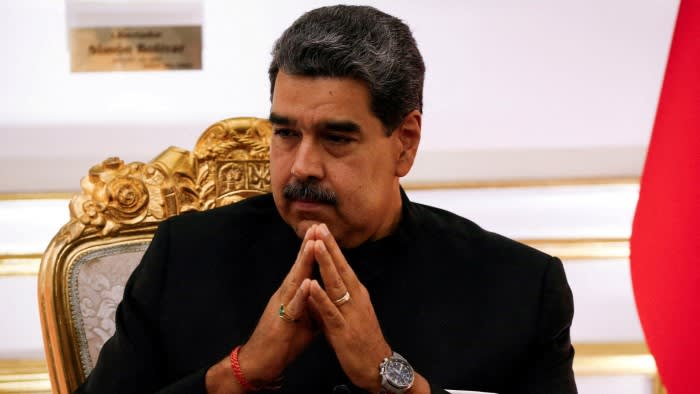Unlock the Editor’s Digest for free
Roula Khalaf, Editor of the FT, selects her favourite stories in this weekly newsletter.
Venezuela will hold its presidential election on July 28, ending speculation over when polls will be held as political repression increases in the South American country.
Socialist strongman President Nicolás Maduro is expected to run for re-election of the Opec member, though he has yet to announce his candidacy. It is also unclear who he will run against, as opposition candidate María Corina Machado — who overwhelmingly won an October primary — has been disqualified.
The announcement by the country’s national electoral council on Tuesday comes amid rising tensions between Caracas and Washington. In October the US announced a temporary relaxation of sanctions on Venezuela’s energy and mining sectors and on secondary debt trading.
The rollbacks followed an agreement between the opposition and Maduro’s government to hold elections in the second half of this year, though that was conditional on political reforms — including lifting candidate bans and releasing political prisoners — and was set for review on April 18.
The US in January reimposed sanctions on state miner Minerven, after Venezuela’s supreme court upheld a ban on Machado’s candidacy. With candidates only having until March 25 to declare their candidacy, Machado does not have much time to plot her next move.
Maduro has recently appeared to flout Washington’s threats. Human rights lawyer Rocío San Miguel was arrested last month while members of her family briefly went missing. Caracas also expelled all staff at the UN Human Rights Commission.
The election will fall on the birthday of Hugo Chávez, the transformative leftist president who governed Venezuela from 1999 until his death in 2013. During his tenure, Chávez launched his so-called “Bolivarian revolution”, and remade the Venezuelan economy with heavy social spending underwritten by oil exports.
When Maduro assumed power following his mentor’s death, a downward spiral that had begun under Chávez accelerated. Since 2013, Venezuela’s economy has shrunk about 70 per cent, with regular bouts of hyperinflation and shortages of food and medicine. Some 7.7mn Venezuelans have fled the repression and economic hardship, with many making their way north to the US.
Local pollsters suggest that in a fair contest, Machado would beat Maduro with 70 per cent of the vote. With an election date set, the president is now expected to announce his candidacy for a third term.
Given the short timeframe, it is uncertain whether international observers will be able to monitor the vote, as agreed by the opposition and the government in October. Maduro has criticised such missions after his 2018 re-election was viewed as fraudulent by the US, the EU and election monitors.
